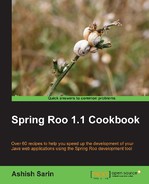In the recipe Creating integration tests for persistent entities, we saw how Spring Roo helps with the creation of integration tests. In this recipe we look at how Spring Roo simplifies the generation of a mock test for an entity using the test mock command.
Exit the Roo shell and delete the contents of the C:
oo-cookbookch02-recipes directory.
Execute the ch02_jsr303_fields.roo script. It creates a flight-app Roo project and sets up Hibernate as the persistence provider using the persistence setup command. The script also creates a Flight entity, which has FlightKey as its composite primary key class, and adds fields to the Flight and FlightKey classes. If you are using a different database than MySQL or your connection settings are different from what is specified in the script, then modify the script accordingly.
Start the Roo shell from the C:
oo-cookbookch02-recipes directory.
Follow these steps to create mock tests:
- Set the focus of Roo on the
Flightentity, using thefocuscommand:roo> focus --class ~.domain.Flight - To create a mock test for the
Flightentity, execute the followingtestmockcommand:~.domain.Flight roo> test mock Created SRC_TEST_JAVAsample ooflightappdomainFlightTest.java
The execution of the test mock command creates a JUnit test, FlightTest.java, which is responsible for mock testing of the Flight entity, as shown here:
package sample.roo.flightapp.domain; @RunWith(JUnit4.class) @MockStaticEntityMethods public class FlightTest { @Test public void testMethod() { int expectedCount = 13; Flight.countFlights(); ..AnnotationDrivenStaticEntityMockingControl. expectReturn(expectedCount); ..AnnotationDrivenStaticEntityMockingControl.playback(); org.junit.Assert.assertEquals(expectedCount, Flight.countFlights()); } }
If you are using Spring Roo 1.1.3, then you'll have to add the @MockStaticEntityMethods and @RunWith(JUnit4.class) annotations in Roo-generated mock tests, as shown.
In the code listing, the @MockStaticEntityMethods annotation represents a Spring annotation which supports mock testing of static entity methods, like count and finder methods. Spring defines an AnnotationDrivenStaticEntityMockingControl aspect, which applies to methods of a test class annotated with @MockStaticEntityMethods and mocks calls to the static methods of the persistent entity. Additionally, the AnnotationDrivenStaticEntityMockingControl aspect defines the expectReturn and playback methods to simplify writing mock tests.
As the AnnotationDrivenStaticEntityMockingControl aspect applies to any class annotated with @MockStaticEntityMethods, it makes it possible to write tests using any testing framework (JUnit or TestNG) for mock testing entities. For testing of instance methods defined in the entity, you'll continue to use the common approaches for mock testing using EasyMock, Mockito, and so on.
